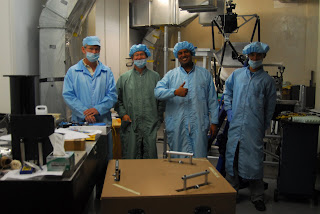The original CGH mounting assembly needed some extra measures, such as the springs shown below, to safely cope with the extra weight of the big CGH.
The XYZ stages & tip/tilt actuators also had to be tested & characterised to ensure that they could reliably manipulate a dummy mass representing the CGH, both when the test is done in the vertical & at the operational angle of 37 degrees.
Following successful testing of the mount assembly, the CGH was bonded to its titanium base & allowed to cure for a few days before being attached to the actuator system.
A gauge rod was also added to the setup to allow measurement of the height of the CGH as this will be needed when setting its axial position for the test.
It was found that the Faro probe could be supported below the end of the gauge rod & the CGH slowly lowered until the rod makes contact with & deflects the probe - an axial resolution of 5 microns is easily achieved in this way.
Time for some more CGH art!
Spectacular rainbow rings from illuminating the CGH with an array of LEDs.








































